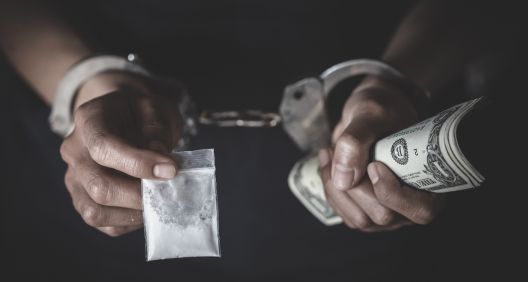Schedule a Consultation
Galveston Drug Crime Lawyer


Galveston Drug Crime Attorney
Texas maintains very strict laws related to drug possession due in large part to the government’s efforts to combat drug trafficking issues. Because of this, drug possession charges in Galveston can carry significant penalties that can severely impact your life if convicted. It is, therefore, vital that you partner with a qualified and experienced criminal defense attorney with a proven record of success in drug crime cases to defend your case and uphold your rights.
Criminal Defense and Drug Crime Representation in Galveston, TX
The lawyers at the Law Office of Joseph Ruiz, PLLC, have long been handling the criminal offense cases that others find intimidating. With a passionate commitment to our clients, we utilize over a decade of experience in the courtroom to fight for the most favorable possible outcome in every case. If you’ve been charged with drug possession or another drug crime, work with a Galveston drug crime lawyer who understands how to build an effective defense and uphold your rights.
What Constitutes Drug Possession in Texas?
Texas law regarding controlled substances defines “possession” as having actual care, control, custody, or management over the drug in question. From a legal standpoint, ownership is not the most important consideration. Rather, the prosecution must prove that you knowingly had control over the substance to do with it what you’d like. Instead, your Galveston drug crime defense attorney will help establish a defense that challenges any proof of possession or will call any search or seizure performed by law enforcement an unconstitutional act.
Why Do I Need a Drug Crime Defense Lawyer?
When you are facing potentially devastating penalties for a criminal charge, your greatest opportunity to find leniency, grace, or a reduction of charges is prior to a conviction. Your Galveston drug crime attorney can listen to the details of your case, examine the evidence, and present the most effective defense strategy for your circumstances.
How Does the Fourth Amendment Help My Case?
When it comes to possession of a controlled substance, it is vital to hire an attorney who is experienced in using the Fourth Amendment’s search and seizure law to avoid convictions. This defense relies on solid facts and is often the most effective defense in drug crimes involving possession.
The 4th Amendment to the U.S. Constitution protects citizens’ rights against unreasonable searches or seizures of their person, homes, and personal property. This means that none of their effects can be searched or taken without probable cause, due process, and, in most cases, a properly issued warrant.
This constitutional right requires police officers to follow proper procedure when searching personal property. If Houston law enforcement failed to use appropriate police procedure in your case, then your charges could ultimately be dismissed for lack of legal evidence. Because the interpretation and application of the Fourth Amendment have been subject to varying legal discussion, challenges, and precedent, it is imperative that your attorney be knowledgeable in both the historical and contemporary application of this law as it is used in drug crime defense.
How Does Texas Classify Drug Groups?
Texas law classifies controlled substances into four different categories, known as penalty groups. Drugs are categorized into each group based on each substance’s accepted medical uses and the risks of abuse. The groups include:
- Penalty Group 1. Comprised of mostly narcotics, the drugs in this group serve no medicinal purposes and are tightly controlled. Examples include opioids, codeine, hydrocodone, oxycodone, heroin, cocaine, methamphetamine, ketamine, and hallucinogens.
- Penalty Group 1-A. This group is composed of LSD and its various salts and isomers. Rather than being measured in grams, this group is measured by units.
- Penalty Group 2. Hallucinogenic substances, such as Ecstacy, PCP, and mescaline, fall into this group.
- Penalty Group 2-A. This group covers chemical compounds aiming to mimic cannabinoids.
- Penalty Group 3. Generally comprising of prescription drugs containing stimulant or depressant effects that carry the potential for abuse, this includes opioids and opiates not listed in Penalty Group 1, sedatives, such as Valium and Ritalin.
- Penalty Group 4. Substances not categorized in Penalty Group 3 will generally be placed in Group 4, such as anabolic steroids and benzodiazepines. Both groups are similar, with Penalty Group 4 substances carrying slightly less risk of abuse.
When determining penalties for a drug crime conviction, the judge will use these groups as a guide, taking the drug volume, mitigating factors, and whether a minor was present into account as well.
What Are the Penalties for a Drug Possession Conviction?
For each of the drug group classifications, there is a baseline guide for the penalties associated with their respective convictions. There are as follows:
- PG1, narcotics
- Minimum: State jail felony for possession of less than 1 gram
- Jail time: 6 months to 2 years
- Fine: up to $10,000
- Maximum: Enhanced felony 1 for possession of more than 400 grams
- Jail time: up to life in state jail
- Fine: up to $100,000
- Minimum: State jail felony for possession of less than 1 gram
- PG1-A, LCD
- Minimum: State jail felony for possession of less than 20 units
- Jail time: 66 months to 2 years
- Fine: up to $10,000
- Maximum: Enhanced felony 1 for possession of more than 8000 units
- Jail time: up to life in state prison
- Fine: up to $250,000
- Minimum: State jail felony for possession of less than 20 units
- PG2, hallucinogens
- Minimum: State jail felony for possession of less than 1 gram
- Jail time: 6 months to 2 years
- Fine: up to $10,000
- Maximum: First-degree felony for possession of more than 400 grams
- Jail time: up to life in state prison
- Fine: up to $100,000
- Minimum: State jail felony for possession of less than 1 gram
- PG2-A, cannabinoid chemical compound copies
- Minimum: Class B misdemeanor for possession of less than 1 gram
- Jail time: up to 6 months
- Fine: up to $2,000
- Maximum: First-degree felony for possession of more than 2000 pounds
- Jail time: up to life in state prison
- Fine: up to $100,000
- Minimum: Class B misdemeanor for possession of less than 1 gram
- PG3, stimulants
- Minimum: Class A misdemeanor for possession of under 28 grams
- Jail time: up to 1 year in county jail
- Fine: up to $4,000
- Maximum: First-degree felony for possession of more than 400 grams
- Jail time: up to life in state prison
- Fine: up to $50,000
- Minimum: Class A misdemeanor for possession of under 28 grams
- PG4, prescription medication
- Minimum: Class B misdemeanor for possession of under 28 grams
- Jail time: up to 6 months in county jail
- Fine: up to $2,000
- Maximum: First-degree felony for possession of more than 400 grams
- Jail time: up to life in state prison
- Fine: up to $50,000
- Minimum: Class B misdemeanor for possession of under 28 grams
FAQs
Q: How Do You Get a Drug Possession Charge Dropped in Texas?
A: You can get a drug possession charge dropped in Texas by legally challenging the basis for the evidence gathered against you. First, this means arguing that the officer had no probable cause to stop you. Second, it means challenging the officer’s legal right to search your person or your property without cause. Lastly, you could prove that the drugs in question belong to someone else and were not legally in your possession. These defenses could lead to dropped charges.
Q: Do First-Time Drug Offenders Go to Jail in Texas?
A: All drug charges carry potential jail time in Texas, even for first-time offenders. Depending on the type of drugs found, the volume possessed, and whether you were found to be in possession near a drug-free zone, such as a school, the courts may or may not elect to require jail time. First-time offenders generally receive lighter penalties. The offense level will have the greatest impact, as the lightest charge carries a maximum of six months of jail time for drug possession.
Q: Is There a Statute of Limitations on a Drug Charge in Texas?
A: For drug charges in Texas, the statute of limitations will vary depending on whether the crime is victimless or not. If the drug charge involves supplying a minor with controlled substances, for example, the statute of limitations does not apply. Otherwise, if there is no victim associated with the charge, which is the case for most drug possession charges, the statute of limitations is three years. Federally, the statute of limitations for drug crimes is five years.
Q: What Is the Punishment for Drug Possession in Texas if Found Guilty?
A: If you are found guilty of drug possession in Texas, the punishment can include fines, probation, and jail or prison time. The least severe charge for illegal drug possession is a Class C misdemeanor carrying a $500 maximum fine. The most serious charge for possession of controlled substances is a first-degree felony charge, which carries a minimum of five years in prison and a $50,000 fine with a maximum lifetime prison sentence and $250,000 in fines.
Speak With a Galveston Drug Crimes Lawyer About Your Case
If you are facing drug crime charges of any kind, it is imperative that you begin working on your defense as soon as possible. Speak with a member of our team at the Law Office of Joseph Ruiz, PLLC, to discuss the details of your case. With a solid grasp of your rights and updated Fourth Amendment law, our attorneys can use whatever means necessary to present your defense and potentially lower your charges. Contact our office today.
How can we help you
To get your free consultation started, please call
281-300-8695 or fill out the form below and
we will get back to you as soon as possible.
Schedule a Consultation





